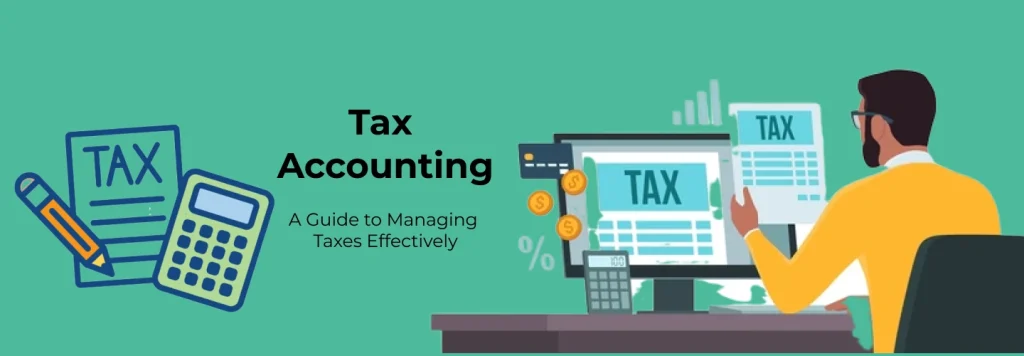Tax is a critical part of financial life—both for individuals and businesses. With ever-evolving tax laws, deadlines, and compliance requirements, it’s easy to feel overwhelmed. That’s where tax accounting comes in. It’s a focused branch of accounting that ensures tax obligations are met accurately and efficiently, while also exploring ways to legally reduce tax liabilities.
In this article, we’ll explain what tax accounting is, how it works, and why it’s essential for staying compliant and financially organised.
Table of Contents
What is Tax Accounting
Tax accounting is a type of accounting that focuses specifically on taxes rather than the preparation of general financial statements. It involves tracking income, expenses, assets, and liabilities to calculate tax liability according to the applicable tax laws.
Unlike financial accounting, which aims to provide information to stakeholders, tax accounting is used to:
Calculate taxes owed to the government
Prepare and file tax returns
Ensure compliance with tax regulations
Assist in planning to legally reduce tax burdens
Whether it’s income tax, VAT, corporation tax, or capital gains tax, tax accounting plays a vital role in managing these obligations effectively.
Why is Tax Accounting Important?

Compliance with the Law
One of the main goals of tax accounting is to ensure that individuals and businesses comply with local and national tax regulations. Non-compliance can lead to penalties, audits, and legal issues.
Accurate Tax Reporting
Proper tax accounting ensures that all income and allowable expenses are correctly reported, which helps avoid overpaying or underpaying tax.
Effective Tax Planning
Tax accountants can identify deductions, exemptions, and strategies to reduce tax liability legally, supporting better financial decisions throughout the year.
Audit Preparation
In the event of an audit by tax authorities, well-maintained tax records serve as reliable documentation and evidence.
Who Needs Tax Accounting?
Individuals
Especially those with multiple income sources, investments, rental properties, or self-employment income.
Small Businesses and Startups
To manage VAT, payroll taxes, and corporation tax, and to benefit from available reliefs and allowances.
Corporations
To handle complex tax planning, deferred taxes, international tax compliance, and regulatory reporting.
Nonprofits
To maintain compliance with regulations that govern charitable and exempt organisations.
Types of Taxes Covered in Tax Accounting
Personal Income Tax
Corporation Tax
Capital Gains Tax
Inheritance Tax
VAT (Value Added Tax)
PAYE and National Insurance Contributions
Excise Duties and Stamp Duties
Each of these has unique rules and filing requirements, which tax accountants help navigate.
Methods Used in Tax Accounting
Cash Basis Accounting
Income and expenses are recorded when money is received or paid. This is simpler and often used by small businesses and sole traders.
Accrual Basis Accounting
Income and expenses are recorded when they are earned or incurred, not when cash changes hands. This method gives a more accurate picture of financial position and is commonly used by larger businesses.
Key Tasks in Tax Accounting
- Tracking income and deductible expenses
- Preparing and submitting tax returns
- Calculating VAT obligations
- Determining payroll tax liabilities
- Filing returns with HMRC or local tax authorities
- Advising on tax-efficient structures and transactions
- Handling tax audits and correspondence with authorities
Benefits of Tax Accounting
Avoiding Penalties
Ensures timely and accurate tax submissions to prevent late fees and legal consequences.
Maximising Deductions
Captures all allowable expenses, tax credits, and reliefs to reduce tax payable.
Saving Time
Tax professionals or software solutions simplify complex rules and keep your financial records clean.
Supporting Growth
With proper tax planning, businesses can invest more confidently and allocate resources effectively.
Tax Accounting in the UK: What You Need to Know
Self-Assessment Tax Returns
Required for self-employed individuals, landlords, and high earners. Must be filed annually by 31 January.
Corporation Tax
Limited companies must file corporation tax returns and pay any tax due within nine months and one day after their accounting period ends.
VAT
Businesses earning over the VAT threshold (£90,000 in 2025) must register and submit quarterly VAT returns under Making Tax Digital (MTD) rules.
PAYE
Employers must withhold and submit income tax and National Insurance through Pay As You Earn.
Tax accounting ensures these obligations are met efficiently and without error.
Software Tools for Tax Accounting
Technology has transformed how tax accounting is done. Some popular tools include:
Xero – Cloud-based accounting with built-in VAT and MTD tools.
QuickBooks – Comprehensive solution for small businesses and self-employed professionals.
TaxCalc – Widely used by UK tax professionals for personal and corporation tax returns.
Sage – Trusted software for both payroll and tax reporting.

These platforms offer automation, reminders, digital submissions, and real-time tracking of tax liabilities.
Tax Accountant: Role and Qualifications
A tax accountant helps individuals and businesses manage all aspects of taxation. Their services include:
Tax return preparation
Strategic tax planning
Investigating and resolving tax discrepancies
Liaising with HMRC
Qualifications may include:
ATT (Association of Taxation Technicians)
CTA (Chartered Tax Adviser)
ACCA or ACA with a tax focus
CIMA for management-level tax planning
Conclusion
Tax accounting is essential for managing your financial obligations and making the most of available tax reliefs. With proper systems, knowledgeable professionals, and a proactive approach, you can stay compliant, avoid penalties, and make smarter financial decisions.
Whether you’re self-employed or managing a company, investing in reliable tax accounting is an investment in your financial future.
Other Related Readings
What Is Accounting? A Beginner’s Guide to Financial Basics
What is Bookkeeping? A Complete Beginner’s Guide
What is Financial Accounting? A Clear Guide for Beginners
What is Managerial Accounting? A Practical Guide for Business Decision-Making
What is Cost Accounting? Understanding Costs to Boost Profitability
What is Tax Accounting? A Practical Guide for Businesses and Individuals
What is Public Accounting? Services, Roles, and Career Insights
What is Private (Corporate) Accounting? A Guide for Businesses and Aspiring Accountants






